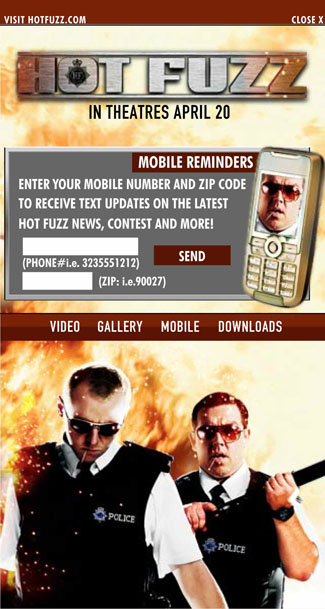
Movie distributors have placed ads and promotions on mobile telephones only sparingly, emphasizing Internet websites patronized by consumers using a PC. But mobile looks to shake off its backwater status as cell phones become more sophisticated with web browsing, voice messages blasts and video.
Theatrical marketing campaigns for mobile include voice messages from stars such as Emma Roberts tied to last month’s release of Warner’s “Nancy Drew”; a thriller game for “The Manchurian Candidate”; and kids mini-game for Fox’s “Ice Age 2: The Meltdown.”
For the 2004 release of “Manchurian Candidate,” Paramount Pictures enlisted the drama’s co-writer Daniel Pyne to script a game in which cell phone users that sign up received breathless phone calls with clues about the Manchurian Candidate. “It’s a powerful way to communicate with consumers with personal messages,” says David Gale, senior account manager of Vibes Media, a Chicago based interactive advertising agency that works for Hollywood studios.
In movie marketing budgets these days, mobile spending often comes from the pot of money designated for “emerging media” that also includes in-video game advertising, podcasts and promotions with user generated content. These are segments where data on audience and return-on-investment (ROI) are small or difficult to measure, unlike booming website banner ads and web search marketing.
While used sparingly so far, movie marketing via cell phones can take several forms:
+ Most common are mobile phone SMS text messages (short message service), particularly to get playtimes for a selected film in the caller’s area
+ Downloads of ring tones
+ Mini-game downloads designed for play on small mobile phone screens
+ Contests and sweepstakes using mobile’s interactive capabilities
+ Receiving pre-recorded voice messages from movie characters, after mobile users opt-in to receive such calls
+ For more sophisticated phones, purchasing reserved tickets
+ Linking to rudimentary WAP mobile sites containing text information, audio and still pictures for a given film
Apple rolling out its iPhone smart phone this year enabled many capabilities that flip-top mobile phones lacked.
The most obvious application for mobile is providing local playtimes via SMS emails received by cell phones, responding to queries. “SMS is quick, short and inexpensive, and can get this information faster than any regular phone call,” said Chris Geromini, executive vice president at Terry Hines Associates, which is an ad agency that specializes in creating movie playmate listings. Its 43KIX mobile service delivers geographic specific information on theater dates in response to SMS queries to short code 43KIX (translates to 43549). Users also input a movie title and a postal zip code.
Another mantra is more cross-platform promotions, meshing two or more platforms in a single effort. An example is MovieConnect, whose web banners ads provide local show time information to consumers when they type in their cell phone number and zip code. Afterwards, an SMS text message is sent to the consumer’s mobile phone that can include ads. This relieves consumers of typing outgoing emails on small cell phone keypads. “It’s a seamless way for consumers to have a piece of the website in their pockets,” said MovieConnect’s David Bailey.
In another example of a cross media promotion involved Warner Bros.’ “300” at a Detroit Red Wings hockey game earlier this year. The arena announcer asked the audience to pull out their cell phones as does a slide projected on the Jumbo-tron giant screen.

Then, the “300” trailer rolls on the screen. Next, the announcer and slides tell the audience that the first 300 people to text WINGS and their ZIP CODE to 43KIX (43549) win passes to a special screening before the sword-and-scandal epic opens. Each person is sent messages back informing entrants if they won or not and how to “opt out,” if they want. On opening day, they are sent show times via free text message with an embedded link to purchase them using their phone.
To facilitate connecting movie marketers with consumers, interactive media firm Aura Group launched its MovieConnect software. “The system allows viewers to click online banner ads and have showtimes beamed directly to their cell phone,” says a press release.
“With over 8+ billion text messages sent monthly in the U.S., consumers are becoming increasingly accustomed to receiving information via text messaging,” Aura’s CEO David Bailey is quoted in the press release. “Now that banner ads can send movie times directly to your phone, our system has taken this medium to a whole new level.”
Movie mobile marketing is more prevalent Europe and parts of Asia, where the mobile culture is more deeply ingrained than the U.S., whose population is more orientated to personal computers. But the wave of sophisticated phones being bought in the U.S. is expected to narrow the gap.
Related content:
Leave a Reply